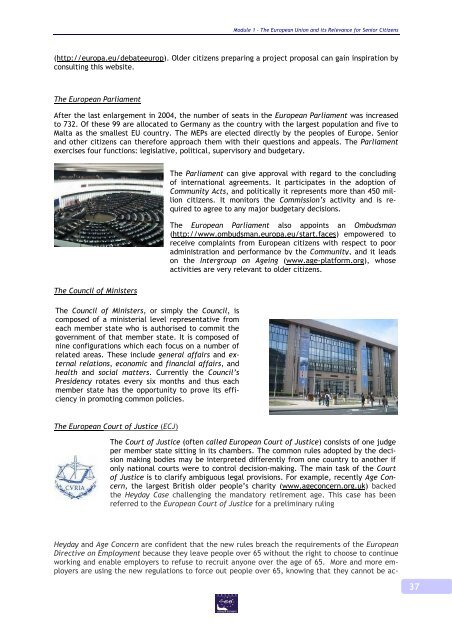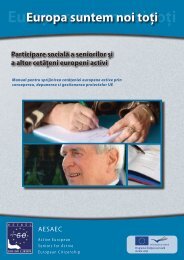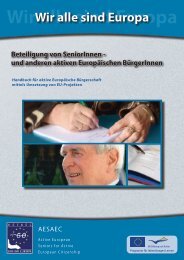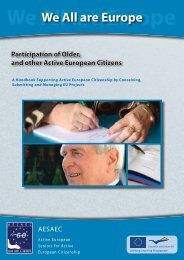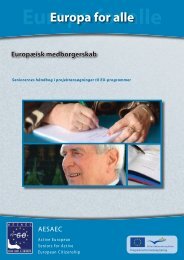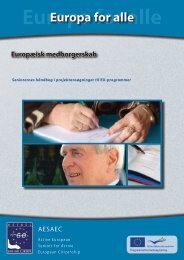We All are Europe - AESAEC
We All are Europe - AESAEC
We All are Europe - AESAEC
Create successful ePaper yourself
Turn your PDF publications into a flip-book with our unique Google optimized e-Paper software.
Module 1 – The <strong>Europe</strong>an Union and its Relevance for Senior Citizens<br />
(http://europa.eu/debateeurop). Older citizens preparing a project proposal can gain inspiration by<br />
consulting this website.<br />
The <strong>Europe</strong>an Parliament<br />
After the last enlargement in 2004, the number of seats in the <strong>Europe</strong>an Parliament was increased<br />
to 732. Of these 99 <strong>are</strong> allocated to Germany as the country with the largest population and five to<br />
Malta as the smallest EU country. The MEPs <strong>are</strong> elected directly by the peoples of <strong>Europe</strong>. Senior<br />
and other citizens can therefore approach them with their questions and appeals. The Parliament<br />
exercises four functions: legislative, political, supervisory and budgetary.<br />
The Parliament can give approval with regard to the concluding<br />
of international agreements. It participates in the adoption of<br />
Community Acts, and politically it represents more than 450 million<br />
citizens. It monitors the Commission’s activity and is required<br />
to agree to any major budgetary decisions.<br />
The <strong>Europe</strong>an Parliament also appoints an Ombudsman<br />
(http://www.ombudsman.europa.eu/start.faces) empowered to<br />
receive complaints from <strong>Europe</strong>an citizens with respect to poor<br />
administration and performance by the Community, and it leads<br />
on the Intergroup on Ageing (www.age-platform.org), whose<br />
activities <strong>are</strong> very relevant to older citizens.<br />
The Council of Ministers<br />
The Council of Ministers, or simply the Council, is<br />
composed of a ministerial level representative from<br />
each member state who is authorised to commit the<br />
government of that member state. It is composed of<br />
nine configurations which each focus on a number of<br />
related <strong>are</strong>as. These include general affairs and external<br />
relations, economic and financial affairs, and<br />
health and social matters. Currently the Council’s<br />
Presidency rotates every six months and thus each<br />
member state has the opportunity to prove its efficiency<br />
in promoting common policies.<br />
The <strong>Europe</strong>an Court of Justice (ECJ)<br />
The Court of Justice (often called <strong>Europe</strong>an Court of Justice) consists of one judge<br />
per member state sitting in its chambers. The common rules adopted by the decision<br />
making bodies may be interpreted differently from one country to another if<br />
only national courts were to control decision-making. The main task of the Court<br />
of Justice is to clarify ambiguous legal provisions. For example, recently Age Concern,<br />
the largest British older people’s charity (www.ageconcern.org.uk) backed<br />
the Heyday Case challenging the mandatory retirement age. This case has been<br />
referred to the <strong>Europe</strong>an Court of Justice for a preliminary ruling<br />
Heyday and Age Concern <strong>are</strong> confident that the new rules breach the requirements of the <strong>Europe</strong>an<br />
Directive on Employment because they leave people over 65 without the right to choose to continue<br />
working and enable employers to refuse to recruit anyone over the age of 65. More and more employers<br />
<strong>are</strong> using the new regulations to force out people over 65‚ knowing that they cannot be ac-<br />
37


